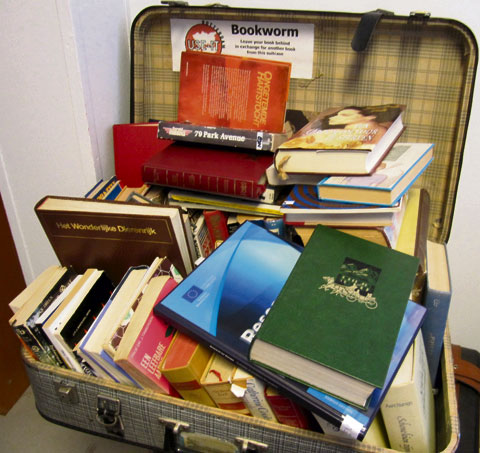Set your old books free and catch a few well-travelled chapters through bookcrossing: the ritual that unites one of the world’s fastest-growing bookworm communities.
The idea of bookcrossing is to give books a second life by releasing them from your bookshelf to public places where others can pick them up and read them, and then release them again. The idea was born from the thought that people would love to track the journeys of their old books.
To become a bookcrosser, you register your book at the bookcrossing website, get a bookcrossing ID (BCID) for the book, release it into the ‘wild’ and then are able to follow where your book travels whenever somebody catches and registers it.
The official bookcrossing site has been running since 2001 and currently has 900,000 members and some 6 million books registered worldwide. The Netherlands is home to one of the largest bookcrossing communities in the world, with over 1,500 books released into the wild every month.
Having first heard of bookcrossing several years ago, I was eager to try it out for myself, so I raided my bookshelf for titles I had either read or wasn’t going to, registered and labeled them, and then set out on a bookcrossing tour.
The goal was not only to release my dusty old books but also to pick up some new interesting reads. There are two ways to look for released books. One is through the website’s ‘go hunting’ function, which tells you which books have been released in the past month. Click on an area close to you and hunt away. The other option is to go to places registered as official bookcrossing zones (OBCZ) and hope to find something interesting there. I chose the latter option.
Journeys
After making an itinerary of five OBCZs in Delft, Den Haag and Rotterdam, I was ready to bookcross! Honestly, I thought I’d be lucky to find half a dozen books at any of these sites, seeing that the website listed no new books at those locations. To my surprise, though, there was a large shelf brimming with released titles at the very first destination on my itinerary (Delft’s Café De Waag, where I also met fellow bookcrossers, a mother and daughter, who first started bookcrossing several years ago.
“Mostly you won’t find very good books on these shelves; usually it’s mediocre novels and chick-lit. I come here for the chick-lit,” the lady said, smiling and nodding at the book I was holding, a mystery thriller by a famous Dutch author. Indeed, most books on the shelf looked like something I’d want to get rid of as well, with the occasional bestseller or famous author peeking through.
For the rest of the day my bookcrossing experiences were mixed. One OBCZ on my list had a tidy book-exchange corner, with interesting titles in Dutch and English. Another OBCZ no longer existed, while yet another had mostly discarded library books and titles in strange foreign languages (it was located at a tourist information center), none of which had the BCID label. The last OBCZ I visited had a gorgeous, large bookcrossing shelf that had been neglected for so long that none of the young staff knew what bookcrossing was or that the café was actually a registered OBCZ.
For better or worse, by the end of the day I had a pretty respectable catch: two Dutch bestsellers, three English novels and a cook book.
Overall, my bookcrossing journey taught me that bookcrossing is alive and kicking in the Netherlands; that most books are mediocre but even a picky, yet persistent, bookcrosser will find something interesting to read; and that bookcrossing has actually existed for ages, well before the website, in the many hostels, cafés and tourist information centers that have book-exchange shelves where travelers from around the world leave the books they’ve read and pick up ones others have left behind.
Ultimately, though, bookcrossing isn’t only a free way to refresh or clean out your bookshelves. The most exciting part is seeing where the books you’ve released will journey to, or reading about where the books you’ve caught have been and who has read them. One book I had picked up had travelled from Gran Canarias and Scotland before landing in the Netherlands, another had journal entries by seven different people, and yet another had travelled through time: it had been waiting to be caught on the OBCZ shelf for five years. Through these books, I was able to connect with people from distant places and times, and cliché as it may sound, it’s great to feel something in common with somebody who is worlds away.
Het geld stroomt binnen bij de recentelijk opgezette afdeling bionanoscience van prof.dr. Cees Dekker (Technische Natuurwetenschappen). Dekker krijgt een ERC Advanced Grant van 2,5 miljoen euro van de Europese Unie. En vorig jaar liet het Kavli Instituut voor Nanowetenschappen weten dat het de afdeling steunt met vijf miljoen dollar voor de komende tien jaar. Met het Europese geld gaat de hoogleraar onder meer het gedrag van bacteriën onderzoeken.”Nanofabricage-technieken stellen ons in staat om precies gedefinieerde landschappen te bouwen op een chip om de aanpassing en evolutie van bacteriën te bestuderen. We maken eigenlijk een soort Galápagos-eilandjes voor bacteriën. Sommige zullen daarbij oversteken naar een ander eilandje, andere weer niet. Door de omgevingsfactoren en de eigenschappen van de bacteriën te variëren, kun je heel direct de evolutie in ruimte en tijd waarnemen.” Ook gaat hij onderzoeken hoe bacteriën zich door uiterst kleine gaatjes wurmen. En hij zal proberen om biologische poriën na te bouwen.



Comments are closed.